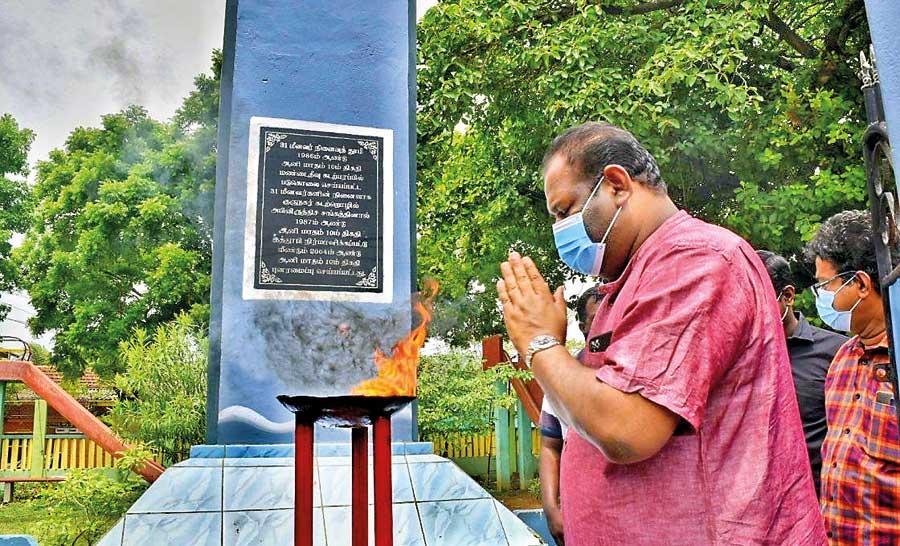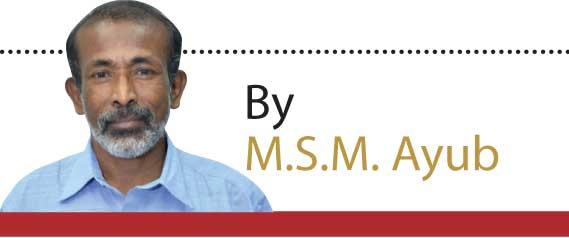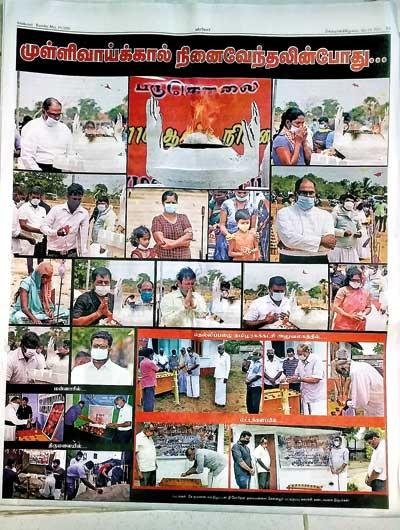Reply To:
Name - Reply Comment

Is quarantine a method of punishment? Definitely, this would be a question that would be raised in one’s mind after reading about or watching the police attempting early this week to prevent Northern politicians from commemorating those Tamils who were killed during the war that came to an end exactly 11 years ago. 
While the government was preparing to commemorate the members of the armed forces and the police who laid their lives in the fight against the Liberation Tigers of Tamil Eelam (LTTE), Northern politicians had also planned commemoration of those Tamils, including the members of the LTTE killed in the war.
However, the government, despite its opposition to the commemorations arranged by the Northern Tamil leaders had not banned those events, but the police had used the prevailing health instructions to prevent the Tamil politicians and the Northern people from attending them.
Some TV channels showed former Northern Province Chief Minister C.V. Wigneswaran heading towards Chemmani, where such a commemoration event had been planned on Monday and police intervening and advising him not to do so. When he argued that he was not breaching any health instruction, a policeman was heard telling him “obathuma oya wede kaloth api obathumawa dawas 14 kata nirodhayanayata yawanawa” (If you proceed we will put you in quarantine for 14 days). Left with no option Wigneswaran obliged.
What is the purpose of the current quarantine process, especially against the current backdrop of the global spread of coronavirus? Hitherto it was perceived as a method of physical isolation of people infected with the highly contagious coronavirus. However, the police seemed to warn Wigneswaran that they would punish him with a period of quarantine if he disobeyed them despite him and his followers assuring them that they would adhere to the health instructions.
Legally the police would have been right, had Wigneswaran breached the dusk to dawn curfew imposed these days in 23 districts including Jaffna and if they had arrested him for that reason, as they have done in the South where more than 50,000 people have already been arrested. The current curfew which is said to have been imposed under the Quarantine and Prevention of Diseases Ordinance (QPDO) promulgated in 1897 and amended on April 11 this year as well as related regulations to prevent the coronavirus which is haunting the whole world these days.
"The government, despite its opposition to the commemorations arranged by the Northern Tamil leaders had not banned those events, but the police had used the prevailing health instructions to prevent the Tamil politicians and the Northern people from attending them "
Wigneswaran had proceeded to the venue of the commemoration during day time and with the permission of the police, as he claimed. He and his group had travelled in separate vehicles wearing face masks. Yet, the police present at the place later had consulted the higher authorities before they prevented him from attending the event.  On the eve of these commemorations, the government had instructed the police in the North not to allow gatherings, in view of the COVID threat. If he had disobeyed this instruction they could have arrested him, but putting him in quarantine would be amusing.
On the eve of these commemorations, the government had instructed the police in the North not to allow gatherings, in view of the COVID threat. If he had disobeyed this instruction they could have arrested him, but putting him in quarantine would be amusing.
Earlier on Sunday Jaffna Magistrate Peter Paul after considering the submissions of the police had ordered Tamil National People’s Front (TNPF) Leader Gajendrakumar Ponnambalam and ten others of his party to be quarantined for 14 days in their houses and ordered five MOHs also to submit a report after 14 days, as the TNPF leaders had conducted several commemoration events in Jaffna on the previous days. However, on the next day (Monday) the magistrate, considering a revision motion by Ponnambalam’s lawyer discharged them on the grounds that the police had not submitted a report to the effect that the suspects had shown symptoms of COVID-19. He had also observed that isolating people without symptoms would affect them psychologically.
It is noteworthy that the government or the police had not banned the commemoration of Tamils including the members of the LTTE killed in the war, except for one event, but used the current threat of the spread of coronavirus, to prevent such events being held. Police had obtained a court order preventing the event that had to be held at the Ilankai Thamil Arasu Katch (ITAK) office in Batticaloa on Monday. Yet, that too had been not on any political grounds but considering the submissions by the police that the event might be attended by large crowds causing health issues under the prevailing situation.
"Police had obtained a court order preventing the event that had to be held at the Ilankai Thamil Arasu Katch (ITAK) office in Batticaloa on Monday. Yet, that too had been not on any political grounds but considering the submissions by the police that the event might be attended by large crowds causing health issues under the prevailing situation"
These incidents had prompted the vociferous former Northern Provincial Council member M.K. Sivajilingam to raise a question at a commemoration event at Polikandi, Valvetiththurai as to how then the government was holding the “Victory Day” in Colombo on Tuesday inviting a large number of people.
However, so many commemoration events were held on Sunday and Monday in many places in the North such as Kovils, churches, government offices, political party offices and the Jaffna University. They were attended by members and office bearers of local government bodies as well.
The main event was held in Mullivaikkal where the final battle was fought between the armed forces and the LTTE in May 2009, with the participation of politicians including former Deputy Minister Prabha Ganesan. Many politicians and people had evaded the police and the army who had set up roadblocks on the way to Mullivaikkal by taking by-roads and footpaths.
The Tamil leaders and Tamil media called these gatherings “commemoration of Mullivaikkal massacre.” Health instructions such as donning face masks and maintaining physical distance had been followed. “Mullivaikkal Declaration”, a statement which described some leaders of the government as “war criminals” was also issued. It was published in Tamil newspapers.
Tamil newspapers on Monday and Tuesday carried a large number of stories on the events. Twenty-three out of seventy-five general new items in a newspaper on Tuesday were on these events. It had also carried a full-page story, a speech made by Wigneswaran at a commemoration meeting held at the office of his political party, the Thamil Makkal Koottani (Tamil People’s Front), apart from the editorial and a quarter page pictorial on the issue. Another newspaper had carried a full-page pictorial.
The importance placed on these events by the Tamil politicians and media indicates the vast division among communities even after 11 years after the end of the war. On the other hand government’s position on the commemoration of Tamils killed in the war is not clear. Is it illegal to hold those events? If so, why didn’t the government ban those commemorations under the relevant law, without citing coronavirus threat? Creating an impression among the people that the government was using the quarantine law to suppress others’ political ideas might lead to a situation where they might ignore the law.